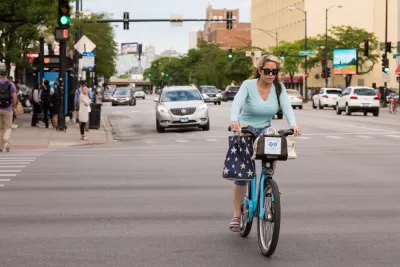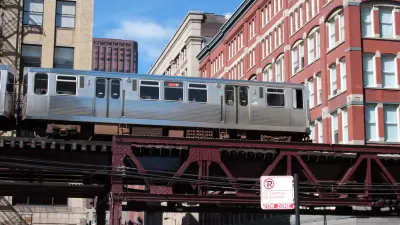Elephants in wine glasses and mobility-as-a-metal-band.

New ideas and old frustrations were on display at this year's National Shared Mobility Summit. The event hosted speakers from the biggest firms in the space, and some of the startups hoping to enter as partners or competitors. These companies shared stages with academics and regulators, all trying to shape mobility's future.
So, what's being shared at the Shared-Use Mobility Center's (SUMC) summit? Car share, bike share (dockless and docked), scooter share, e-bike share, autonomous vehicles, and plans for buses and railways, too. One refrain from the representatives of these businesses and the governments that regulate them was about moving the away from thinking about transportation in a vacuum and taking a more holistic approach toward mobility.
Playing Bass in the Mobility Metal Band
Finnish Ministerial Adviser, Digital Services and Mobility as a Service, Krista Huhtala-Jenks compared a good mobility system to a heavy metal band: public transit is the drummer, the ride hailing, bike sharing, car sharing, and other private mobility providers play guitar, the singer is a mass operator out front that enables payment for all those services, and the regulator is a bassist keeping time for the group.
The idea is that regulator needs to be thinking about how to get the system to work together, rather than dealing with taxis or trains on their own. This means getting data from providers, requiring ride hailing and ride share services to provide data to the cities as a condition of their access. This includes Uber, which is expected to restart operations in Finland this July after suspending service in July of 2017.
In U.S. cities, the bands' singers are largely absent. In the Finish system, Huhtala-Jenks explains, riders can pay for their bike share, public transit, or ride hailing service from one unified payment system. In Finland, several of these services compete, offering different models for payment, from subscription to per-ride.
Access in a World of Shared Mobility
Speakers discussed the need to design with accessibility in mind from the start, not bolted on as an afterthought. Innovations only available to people with credit cards and phones, or only to able-bodied people, leave many behind. One of the startups addressing an aspect of the access problem was a group called MUVE, a small agency working to create a transit-on-demand service for people with special needs. Muve would partner with cities and other organizations to provide trained drivers in specially designed vehicles designed for for scheduled rides or for travel from point to point.
Oboi Reed sat on the Summit Program Committee. After a panel on automated vehicles, when the forum was open to questions from the crowd, Reed asked how we could ensure that new technologies weren't rolled out in ways that leave many neighborhoods and people behind, the way the technologies of the past left old neighborhoods behind.
The question drew a heated response. As that panel began to outline strategies, some in the audience interrupted saying that pat answers won't serve in a time when the Trump administration is in power. These criticisms were in turn greeted with impassioned defenses of the work done on outreach and accessibility by planners around the country. The room was sensitive to the question, but unable to agree on an answer. At times, the discussion became more impassioned than cogent.
It wasn't the last time the specter of Donald Trump hung over the proceedings. During a plenary session, moderator Mariia Zimmerman (MZ Holdings) jokingly asked if there was any leadership on producing equity from the federal government and then laughingly went to the next question knowing she would not get an answer. This is how people referenced the countervailing forces against mobility from the federal government at the conference: with knowing asides, hinted at rather than addressed head on.
Where Ride Hailing Will Move
One of the startups pitching at the conference, Migo, deals with the problem of aggregating diverse transit styles with their app. Migo currently operates in the Pacific Northwest. The app pulls together fare info from ride hailing apps, transit services, car shares, and other transportation alternatives so customers can compare before choosing their preferred options.
Uber, Lyft, and Via were all leadership-level sponsors of the summit and all had speakers on panels. Justin Erlich, Uber's head of policy for autonomous vehicles and urban aviation, was asked what cities should do to help encourage car-free lifestyles and decrease inefficient car uses. Two strategies he suggested were the elimination of parking requirements in favor of allowing developers to offer Uber credits, as well as the implementation of congestion pricing. Elrich also suggested that users will be more likely to use shared rides as the service gets bigger and rides become more direct.
Despite the fact that they were sponsors, ride hailing and sharing apps came in for some criticism from speakers who pointed out that riders with African-American sounding names were more likely to be denied rides. Others referred to studies that showed the services pulled riders out of public transit and into traffic.
Keeping the Beat of Transit
In a talk on the state of transit and shared use mobility, Jarrett Walker questioned the certainty with which many in the tech world predict the future. Saying that marketers are quick to claim a technology will change the world with greater certainty than any such prediction warranted.
He followed this up with the question, "How many elephants can fit into a wine glass?" making the point that while we cannot be certain about many things, the basic "geometry" of the space taken up by an object remains consistent. This is why big vehicles moving many people along fixed routes is so often the best use of space.
The CTA's president, Dorval Carter also spoke at the conference. After entering to a song by Chicago, Carter bemoaned the fact that the CTA had sued the band out of their original name “The Chicago Transit Authority.” He recognized that his service stood to lose a lot from the competition that was all around him at the conference, conceding that, while transit remained the most efficient way to move large numbers of people, the CTA was losing ridership to ride hailing apps, especially in non-peak hours early in the morning and late at night.
Still Carter struck an upbeat tone overall, commending Mayor Rahm Emanuel for his $.15 ride hailing tax, and saluting the trains speeding past traffic every day.

Planetizen Federal Action Tracker
A weekly monitor of how Trump’s orders and actions are impacting planners and planning in America.

Map: Where Senate Republicans Want to Sell Your Public Lands
For public land advocates, the Senate Republicans’ proposal to sell millions of acres of public land in the West is “the biggest fight of their careers.”

Restaurant Patios Were a Pandemic Win — Why Were They so Hard to Keep?
Social distancing requirements and changes in travel patterns prompted cities to pilot new uses for street and sidewalk space. Then it got complicated.

Platform Pilsner: Vancouver Transit Agency Releases... a Beer?
TransLink will receive a portion of every sale of the four-pack.

Toronto Weighs Cheaper Transit, Parking Hikes for Major Events
Special event rates would take effect during large festivals, sports games and concerts to ‘discourage driving, manage congestion and free up space for transit.”

Berlin to Consider Car-Free Zone Larger Than Manhattan
The area bound by the 22-mile Ringbahn would still allow 12 uses of a private automobile per year per person, and several other exemptions.
Urban Design for Planners 1: Software Tools
This six-course series explores essential urban design concepts using open source software and equips planners with the tools they need to participate fully in the urban design process.
Planning for Universal Design
Learn the tools for implementing Universal Design in planning regulations.
Heyer Gruel & Associates PA
JM Goldson LLC
Custer County Colorado
City of Camden Redevelopment Agency
City of Astoria
Transportation Research & Education Center (TREC) at Portland State University
Camden Redevelopment Agency
City of Claremont
Municipality of Princeton (NJ)






























